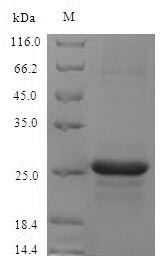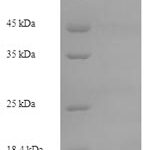Mouse S100A8 / CAGA Recombinant Protein Product Attributes
Product Type: Recombinant Protein
Recombinant S100A8 / CAGA based upon sequence from Mouse
Host: QP6641 protein expressed in E.coli, Yeast..
Tag: His-SUMO
Protein Construction: A DNA sequence encoding the Mus musculus (Mouse) S100A8 / CAGA, was expressed in the hosts and tags indicated. Please select your host/tag option, above.
Recommended Applications: Immunogen, Protein Standard, Cell culture, or Other Cell Biology Applications.
Application Notes: Please contact us for application specific information for QP6641.
Bioactivity Data: Untested
Full Length? Full Length
Expression Region: Pro2 – Glu89
Amino Acid Sequence: PSELEKALSN LIDVYHNYSN IQGNHHALYK NDFKKMVTTE CPQFVQNINI ENLFRELDIN SDNAINFEEF LAMVIKVGVA SHKDSHKE
Purity: Greater than 90% as determined by SDS-PAGE.
Reconstitution Instructions: Concentrated protein in liquid format. Reconstitution is not necessary.
Concentration of Mouse S100A8 / CAGA Protein:
Endotoxin Levels: Not determined.
Buffer: Tris-based buffer, 50% glycerol
Storage Conditions: Store at -20C to -80C.
| Recombinant Mouse S100A8 / CAGA Protein General Information | |
|---|---|
| Alternate Names | |
| S100A8, CAGA, NIF, CFAG, CAGA, L1Ag, MRP8, MA387, MIF, P8, 60B8AG, CGLA, CP-10 | |
| Curated Database and Bioinformatic Data | |
| Gene Symbol | S100A8 |
| Entrez Gene ID | 20201 |
| Ensemble Gene ID | ENSMUSG00000056054 |
| RefSeq Protein Accession(s) | NP_038678.1 |
| RefSeq mRNA Accession(s) | NM_013650.2 |
| UniProt ID(s) | P27005 |
| UniGene ID(s) | Mm.21567 |
| COSMIC ID Link(s) | S100A8 |
| KEGG Gene ID(s) | mmu:20201 |
| General Description of Recombinant Mouse S100A8 / CAGA Protein. | |
| S100A8 is a calcium- and zinc-binding protein which plays a prominent role in the regulation of inflammatory processes and immune response. It can induce neutrophil chotaxis and adhesion. Predominantly found as calprotectin (S100A8/A9) which has a wide plethora of intra- and Extracellular domain functions. The intracellular functions include: facilitating leukocyte arachidonic acid trafficking and metabolism, modulation of the tubulin-dependent cytoskeleton during migration of phagocytes and activation of the neutrophilic NADPH-oxidase. Activates NADPH-oxidase by facilitating the enzyme complex assbly at the cell mbrane, transferring arachidonic acid, an essential cofactor, to the enzyme complex and S100A8 contributes to the enzyme assbly by directly binding to NCF2/P67PHOX. The Extracellular domain functions involve proinfammatory, antimicrobial, oxidant-scavenging and apoptosis-inducing activities. Its proinflammatory activity includes recruitment of leukocytes, promotion of cytokine and chokine production, and regulation of leukocyte adhesion and migration. Acts as an alarmin or a danger associated molecular pattern (DAMP) molecule and stimulates innate immune cells via binding to pattern recognition receptors such as Toll-like receptor 4 (TLR4) and receptor for advanced glycation endproducts (AGER). Binding to TLR4 and AGER activates the MAP-kinase and NF-kappa-B signaling pathways resulting in the amplification of the proinflammatory cascade. Has antimicrobial activity towards bacteria and fungi and exerts its antimicrobial activity probably via chelation of Zn2+ which is essential for microbial growth. Can induce cell death via autophagy and apoptosis and this occurs through the cross-talk of mitochondria and lysosomes via reactive oxygen species (ROS) and the process involves BNIP3. Can regulate neutrophil number and apoptosis by an anti-apoptotic effect; regulates cell survival via ITGAM/ITGB and TLR4 and a signaling mechanism involving MEK-ERK. Its role as an oxidant scavenger has a protective role in preventing exaggerated tissue damage by scavenging oxidants. The iNOS-S100A8/A9 transnitrosylase complex is proposed to direct selective inflammatory stimulus-dependent S-nitrosylation of multiple targets such as GAPDH, ANXA5, EZR, MSN and VIM by recognizing a [IL]-x-C-x-x-[DE] motif; S100A8 ses to contribute to S-nitrosylation site selectivity . | |
Limitations and Performance Guarantee
This is a life science research product (for Research Use Only). This product is guaranteed to work for a period of two years when stored at -70C or colder, and one year when aliquoted and stored at -20C.





Reviews
There are no reviews yet.